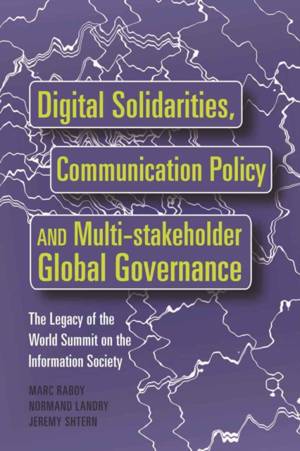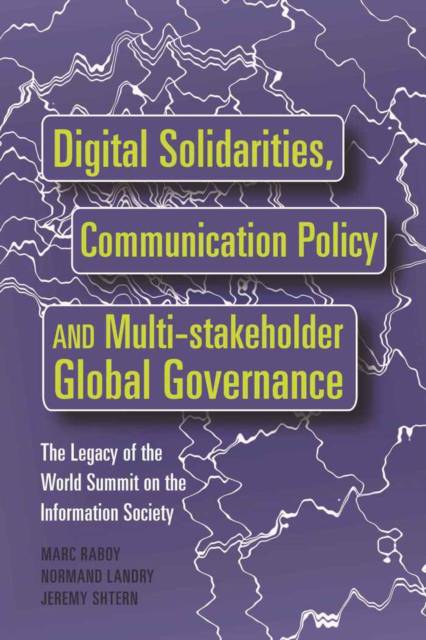
- Afhalen na 1 uur in een winkel met voorraad
- Gratis thuislevering in België vanaf € 30
- Ruim aanbod met 7 miljoen producten
- Afhalen na 1 uur in een winkel met voorraad
- Gratis thuislevering in België vanaf € 30
- Ruim aanbod met 7 miljoen producten
Zoeken
Digital Solidarities, Communication Policy and Multi-stakeholder Global Governance; The Legacy of the World Summit on the Information Society
The Legacy of the World Summit on the Information Society
Marc Raboy, Normand Landry, Jeremy Shtern
Hardcover | Engels
€ 213,95
+ 427 punten
Omschrijving
In 2003 and again in 2005, the international community was called by the United Nations to take part in a World Summit on the Information Society (WSIS). This two-phased summit placed an unprecedented global spotlight on information and communication issues. At the same time, the WSIS represented a grand experiment in global governance: the active participation of non-governmental stakeholders in the development of public policies at the international level.
Digital Solidarities, Communication Policy and Multi-stakeholder Global Governance examines the actors, structures and themes that shaped the WSIS with a particular focus on the role played by civil society. The book investigates how civil society self-organization has continued post-WSIS through the Internet Governance Forum (IGF) and other policymaking venues, and reflects on what the WSIS experience reveals about the challenges and opportunities embedded in the notion of multi-stakeholder governance and its implications for understanding global communication.
Digital Solidarities, Communication Policy and Multi-stakeholder Global Governance examines the actors, structures and themes that shaped the WSIS with a particular focus on the role played by civil society. The book investigates how civil society self-organization has continued post-WSIS through the Internet Governance Forum (IGF) and other policymaking venues, and reflects on what the WSIS experience reveals about the challenges and opportunities embedded in the notion of multi-stakeholder governance and its implications for understanding global communication.
Specificaties
Betrokkenen
- Auteur(s):
- Uitgeverij:
Inhoud
- Aantal bladzijden:
- 282
- Taal:
- Engels
Eigenschappen
- Productcode (EAN):
- 9781433107405
- Verschijningsdatum:
- 18/10/2010
- Uitvoering:
- Hardcover
- Formaat:
- Ongenaaid / garenloos gebonden
- Afmetingen:
- 152 mm x 229 mm
- Gewicht:
- 566 g

Alleen bij Standaard Boekhandel
+ 427 punten op je klantenkaart van Standaard Boekhandel
Beoordelingen
We publiceren alleen reviews die voldoen aan de voorwaarden voor reviews. Bekijk onze voorwaarden voor reviews.








